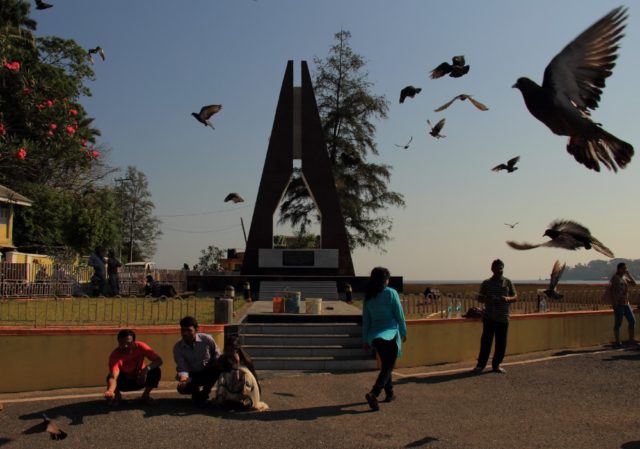Struggle for Independence echoed to the Andamans.
In Aberdeen, Port Blair, a great historic battle was fought between the Andamanese tribes and British intruders. The date was 17th of May 1859.
Since then to this date, the Battle of Aberdeen – as the freedom struggle was commonly known – has been lost in history books forever.

Why the battle in the first place?
Easy peasy.
It was in 1858 when the British decided that they will build a penal colony in South Andaman, a place which is now Port Blair. And yes, you guessed it right. It is the dreaded Cellular Jail, Kaala Paani.
The non-interfering, peaceful Great Andamanese tribes (an umbrella term for ten tribes of the region) then had their first contact with the outsiders. No wonder they called the colonizers lao in their native tongue, which means “colourless ghost”.
The Great Andamanese tribes saw this construction of railways and prison cells as an encroachment upon their land, especially when the British administration had finalised Ross Island as the capital of the archipelago.
Who won?

You obviously cannot expect the bows and arrows of Great Andamanese to win against the powder guns of the British, do you? There were a lot of casualties.
As a result of this, the entire population of the ten tribes came down from 7000 to 3500.
Since the fighters were generally men, aged between 15 years to 35 years, it had a huge impact on the Andamanese population in the future.
Read More: An Assamese Tradition Celebrates Girls’ First Period Just Like A Small Wedding
What exactly went wrong in the battle?
The brave attempt of indigenous tribes to drive away outsiders is much appreciated. They could have won, but there was a Laakha in Bhuvan’s cricket team.
Anthropologist Dr. Bidyut Kumar Das has extensively explained the reason in his book, Mee Ang: An Ethnographic Profile on the Jarawa of Andaman Islands.
A political prisoner called Dudhnath Tiwari had escaped the shackles of Kaala Paani and was discovered wounded on the shore by a group of these tribes.
They carried him to the clan head, and upon his instructions, tended him till his recovery. Soon, Tiwari got acclimatized to that culture. The clan head was so impressed by the fugitive that he married his two daughters to him.
When there were talks about driving away the outsiders Tiwari soaked all the information. One day before the battle, he sneaked away from the Andamanese settlement and informed the British barracks at Aberdeen of the impending danger.
Since then, there is deep distrust that the Andamanese tribes hold towards people from the outside, be it Indians themselves. This is essentially because that Battle single-handedly pushed the Great Andamanese into a pit from which they have still failed to come out.
Dudhnath Tiwari assumed that by revealing the secret to the British, he will be allowed to go to his village, after all, he was just a sepoy from the mutiny of 1857.
And he was successfully repatriated.
This battle was also responsible for exposing this indigenous population to the outside world because of which they acquired diseases like asthma, viral fever, and their low immunity towards these diseases is something visible till today in their dwindling numbers and the concentrated efforts of NGOs to help with their treatment.
Image Credits: Google Images
Other Recommendations:
Dying Languages Of India: The Last Speaker Of An Andamanese Language Is Dead
































